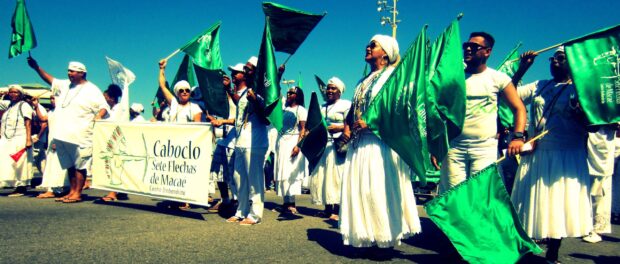
Thousands of people took to the streets of Copacabana on Sunday, September 17, for the 10th Annual March in Defense of Religious Freedom to demand religious tolerance and respect in light of continued violence against practitioners and places of worship of Afro-Brazilian religions such as Candomblé and Umbanda. Multiple religious groups from across the metropolitan region participated to show a united front against intolerance and hate-based violence. “The rally is for us to show ourselves, combat intolerance, and make people know that everyone has their space, no better or worse than others, and principally, with freedom to express your dogma, your religiosity, your way of thinking,” reflected Saulo D’iemanjá, a practitioner of Umbanda from the North Zone of Rio.
The annual rally was hosted in light of a 40% increase in reported cases of religious intolerance from 2016 to 2017. In fact, in the last few months alone, there has been a surge of headlines reporting various intolerance-based crimes, especially in the Baixada Fluminense. One case, especially intense, involved a group of armed men throwing large stones at an elderly woman who was seriously injured. Incidents like this have been growing in frequency; armed groups with links to trafficking have destroyed religious sites and objects while harming and threatening individuals, in the name of Christianity.
As D’iemanjá noted, “these attacks are not new.” Yet while violent attacks have taken place over the years, there is something new about the phenomenon: “We are now under the municipal administration of a bishop, who showed a different side during his campaign, speaking of equality. We are starting to see that there is already a difference.” Mayor Marcelo Crivella is a licensed bishop from the Universal Church of the Kingdom of God, a Pentecostal Christian denomination that has been accused of religious intolerance, among other crimes, in places across the globe. In fact, in his time as mayor, he has already presided over a decree that many have criticized as biased against Afro-Brazilian religions. His decree, which created a platform for the licensing of city events, gives his administration more power in deciding which events take place and are supported by the city government. While religious events are often fast-tracked, “cultural” events are not; in many cases Afro-Brazilian religious events are considered cultural rather than religious and have been subject to attack by government officials. “A good example is this rally itself. Up until this week, it was not authorized; in reality, I don’t know if it ever was,” recalled D’iemanjá.

Religious leaders and activists decided to hold the rally regardless of official approval by the mayor’s administration and organized a successful parade. Whether armed groups feel emboldened by the mayor’s convictions or not, the simple fact is that these intolerance-based crimes are on the rise and involve not only religious discrimination but racial discrimination as well. From January 2016 until May 2017, 1,828 cases of racial injustice were recorded in the state of Rio de Janeiro; black women were the targets in 60% of those cases. The decisions and attitudes of public leaders directly impact the way communities and groups behave; this can be seen in places across the globe where the profiles of hate groups are growing with little political backlash. If the Mayor of Rio’s administration remains silent, these attacks will continue to grow against some of society’s most vulnerable, bringing into question not only the state of religious tolerance in Rio de Janeiro, but the moral leanings of the mayor himself.


